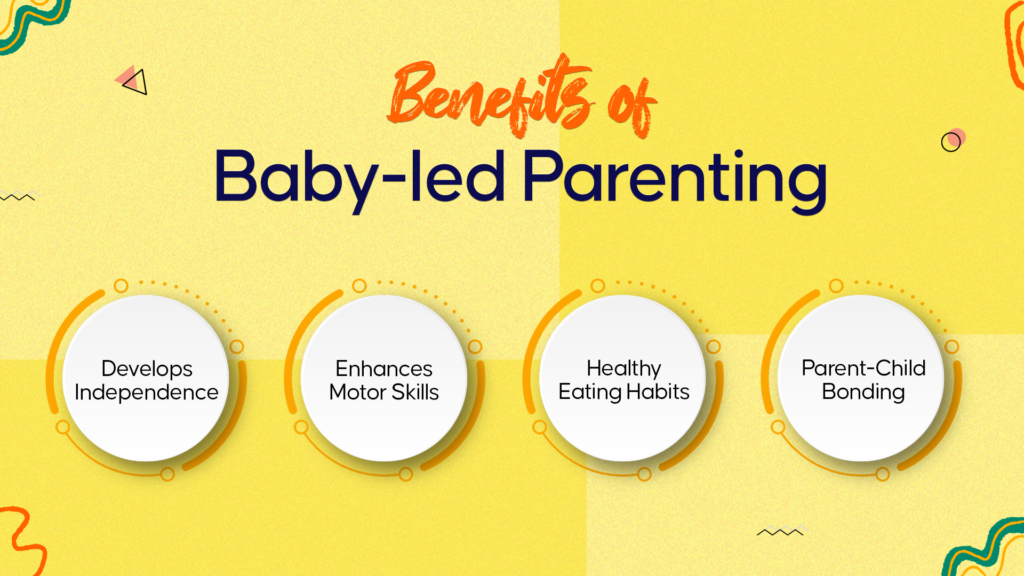Parents always wonder how they can empower their little ones from the very beginning. Through each developmental milestone, parents try different methods to provide a nurturing environment to facilitate growth. One approach that has gained significant popularity in recent years is baby-led parenting. Rooted in the belief of nurturing independence and trusting your child’s instincts, baby-led parenting allows babies to take the lead in their developmental journey.
Baby-led parenting is not just another parenting trend; it’s a unique approach that recognizes your baby’s innate drive to explore and learn. It puts forth the idea that even the tiniest of humans possess an incredible sense of curiosity, and by giving them the freedom to lead, we unlock a world of endless possibilities.
Let us dive deep into the world of Baby-led Parenting and explore its benefits, and essential considerations for parents embracing this approach.
What is Baby-led Parenting?
Baby-led parenting, also known as child-led parenting or responsive parenting, revolves around the philosophy of treating your baby as an individual with unique preferences and abilities from the very beginning.
It involves allowing your little one to explore their environment, make choices, and learn at their own pace. From feeding to sleep, and even playtime, baby-led parenting encourages parents to trust their child’s instincts while providing a safe and supportive environment.
The Benefits of Baby-led Parenting

- Development of Independence: By allowing babies to explore and make decisions, baby-led parenting fosters a sense of independence from an early age. As they grow, children who have experienced this approach tend to exhibit greater self-confidence and problem-solving skills.
- Enhanced Motor Skills: Baby-led parenting encourages self-feeding and self-movement, which allows babies to develop their motor skills naturally. From picking up small food items to crawling or walking, they learn to control their bodies at their own pace, building strength and coordination.
- Healthy Eating Habits: Baby-led weaning, a key aspect of baby-led parenting, promotes a healthy relationship with food. By allowing babies to explore different tastes and textures, they develop a diverse palate and are more likely to make healthier food choices as they grow.
- Improved Parent-Child Bond: A Child-led Parenting approach emphasizes responsive and respectful interactions between parents and their babies. By following their cues and being attentive to their needs, parents build a strong bond of trust and understanding, which lays a solid foundation for healthy relationships in the future.
Things to keep in mind about Baby-led Parenting
While embracing baby-led parenting, there are several important considerations for parents to keep in mind. Here are some key things to remember:
- Safety First: As your baby explores their surroundings, ensure a safe environment by baby-proofing your home. Remove potential hazards, secure furniture, and always supervise your little one during playtime and mealtime.
- Trust Your Baby’s Abilities: Recognize that they know their limits and capabilities. Allow them to explore and make choices, even if it means getting messy during mealtime or taking a bit longer to achieve certain milestones.
- Patience & Flexibility: Baby-led parenting is a journey that requires patience. Each baby develops at their own pace, so be patient and flexible. Understand that they will progress in their own time and provide the support and guidance they need without pushing or rushing them.
- Embrace the Mess: Baby-led parenting often involves a bit of messiness, especially during self-feeding and exploration. Embrace the mess and understand that it’s a natural part of your baby’s learning process. Use bibs, protective mats, and easy-to-clean surfaces to make cleanup more manageable.
Discover a range of Feeding Essentials that promote Baby-led Weaning & Self-Feeding: BPA-Free Feeding Essentials on Jollee
- Balance Independence with Guidance: While promoting independence, remember that your baby still needs your support and guidance. Be present, observe their explorations, and provide assistance when necessary. Offer encouragement, celebrate their achievements, and provide a secure base from which they can venture out and explore.
- Focus on Responsive Communication: Cultivate a responsive communication style with your baby. Pay attention to their cues, gestures, and sounds, and respond promptly and attentively. Engage in meaningful interactions, listen to their needs, and establish a strong parent-child bond based on trust and understanding.
When should Parents Intervene?
Although baby-led parenting encourages independence and self-discovery, there are certain situations where parental intervention may be necessary. Here are some instances where parents should consider intervening:
- Emotional Distress: Babies may sometimes experience emotional distress or become overwhelmed by certain situations. If you notice signs of distress, such as excessive crying, withdrawal, or extreme frustration, it’s important to provide comfort, reassurance, and a calming presence. Responding to their emotional needs helps create a sense of security and builds trust in their caregiver.
- Developmental Support: Even though baby-led parenting allows babies to develop skills at their own pace, additional support or guidance from a professional is beneficial if they are struggling to meet certain developmental milestones.
Explore a range of Toys that promote Open-Ended Play & Exploration. Open-ended exploration builds children’s confidence and decision-making skills. Toys for free play also boost their self-esteem and problem-solving skills.
Lastly,
Remember that baby-led parenting is an ongoing learning process for both you and your baby. Stay open-minded, be adaptable, and cherish the incredible moments of discovery and growth as you embark on this empowering parenting approach.
Gone are the days of one-size-fits-all approaches. Accordingly, Baby-led parenting embraces the belief that babies are active participants in their development, and as parents, our role is to trust, support, and celebrate their milestones along the way.
As you witness your little one uncover their potential and develop a deep sense of self, you’ll experience the joy and fulfilment that comes from embracing the magic of baby-led parenting.
For more Tips, Check Out: Jollee’s Blog
Discover More Parenting Content on Jollee’s ParentHub






